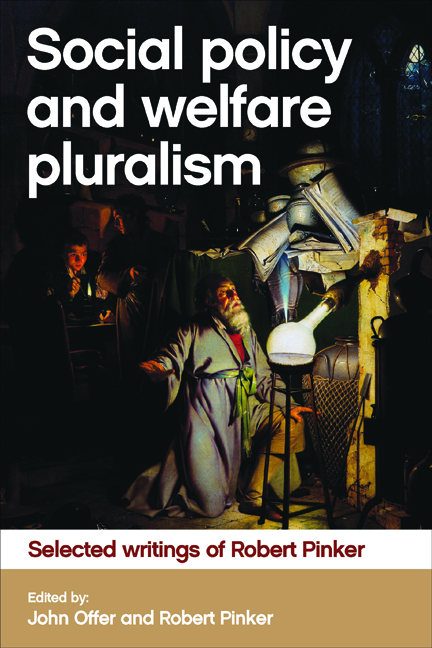Book contents
- Frontmatter
- Contents
- Acknowledgement
- Preface
- General introduction: Robert Pinker on rethinking approaches to welfare
- Introduction to Part One On social policy studies
- one The ends and means of social policy: a personal and generational perspective
- two Social theory and social policy: a challenging relationship
- three Stigma and social welfare
- four The welfare state: a comparative perspective
- five Richard Titmuss and the making of British social policy studies after the Second World War: a reappraisal
- Introduction to Part Two On social care, communities and the conditions for well-being
- six Report of the Working Party on the Role and Tasks of Social Workers: an alternative view
- seven The quest for community: from the Settlement Movement to the Griffiths Report: an historical perspective
- eight Citizenship, civil war and welfare: the making of modern Ireland
- Introduction to Part Three On welfare pluralism
- nine Golden Ages and welfare alchemists
- ten From gift relationships to quasi-markets: an odyssey along the policy paths of altruism and egoism
- eleven The experience of citizenship: a generational perspective
- twelve The right to welfare
- thirteen The prospects for social policy in the UK after the 2015 General Election
- Afterword On the post-Brexit prospects for social policy in the UK
- References
- Index
nine - Golden Ages and welfare alchemists
Published online by Cambridge University Press: 08 April 2022
- Frontmatter
- Contents
- Acknowledgement
- Preface
- General introduction: Robert Pinker on rethinking approaches to welfare
- Introduction to Part One On social policy studies
- one The ends and means of social policy: a personal and generational perspective
- two Social theory and social policy: a challenging relationship
- three Stigma and social welfare
- four The welfare state: a comparative perspective
- five Richard Titmuss and the making of British social policy studies after the Second World War: a reappraisal
- Introduction to Part Two On social care, communities and the conditions for well-being
- six Report of the Working Party on the Role and Tasks of Social Workers: an alternative view
- seven The quest for community: from the Settlement Movement to the Griffiths Report: an historical perspective
- eight Citizenship, civil war and welfare: the making of modern Ireland
- Introduction to Part Three On welfare pluralism
- nine Golden Ages and welfare alchemists
- ten From gift relationships to quasi-markets: an odyssey along the policy paths of altruism and egoism
- eleven The experience of citizenship: a generational perspective
- twelve The right to welfare
- thirteen The prospects for social policy in the UK after the 2015 General Election
- Afterword On the post-Brexit prospects for social policy in the UK
- References
- Index
Summary
The art, or science, of alchemy probably originated among the Alexandrian Greeks in the early Christian era, and eventually became a reputable field of study throughout medieval Europe. Although alchemy was concerned with the conversion of base metals into gold or silver, in another sense it expressed a search for a philosophical principle that would explain the nature of the material world – a prima materia commonly described as the philosopher's stone and sought after by alchemists, who believed that it would reveal the essential unity of all things, animate and inanimate. Once discovered, the philosopher's stone would serve as a catalyst through which base metals would be transmuted into precious ones (Holmyard, 1957).
It was not until the mid-eighteenth century that alchemy was consigned to the realms of occult speculation. In some branches of the social sciences, however – notably in those directly concerned with the enhancement of human welfare – the quest for a universal explanatory principle or theory – an economic, political or social counterpart to the philosopher's stone – has gone on ever since. Such a theory, it is hoped, will explain how the base metals of imperfect humans and their social institutions can be transformed into nobler beings inhabiting a more perfect social order.
Concepts of this kind go back to antiquity, sometimes looking back to a visionary Golden Age, sometimes anticipating a Utopia of the future. They take religious forms like the Garden of Eden or the Heavenly City, and there are countless secular equivalents. The Golden Age is invariably seen as an ideal society in which poverty, sickness, oppression and war are banished, giving way to plenty, health, justice, order and liberty. The Age of Enlightenment – itself looked back on as a Golden Age of sorts by many scholars – produced numerous theories of progress based on a belief in the possibility of personal and collective development towards an ideal state of society (Berlin, 1990, chs 1 & 2; Goodwin and Taylor, 1982).
Classical political economy and the New Right
Turgot, Condorcet and Ferguson were typical of the great Enlightenment scholars who strove to discover a unifying principle that would explain the dynamics of social progress and show how such progress could be achieved (Bierstedt, 1979; Gay, 1973; Berlin, 1980; Porter, 1992).
- Type
- Chapter
- Information
- Social Policy and Welfare PluralismSelected Writings of Robert Pinker, pp. 197 - 208Publisher: Bristol University PressPrint publication year: 2017

